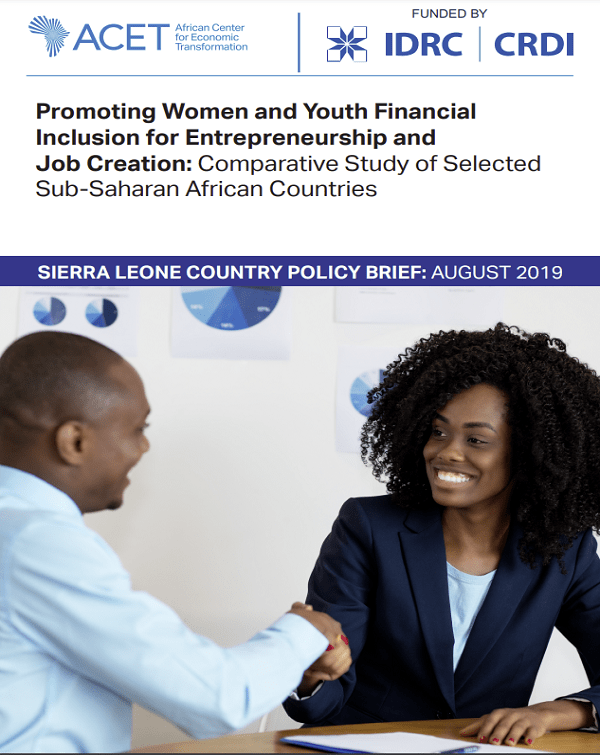Sierra Leone, a country of roughly 7.5 million people with a bank account penetration rate of 20 percent as of 2017, has made modest gains in reducing financial exclusion since 2011. A disproportionate number of the unbanked are women, youth and rural dwellers and there is a 9 percentage point account ownership gap between men and women. Only 10.2 percent of the youth have an account at a formal financial institution, compared with 12.4 percent for the entire population. The failure to close the gender and youth gap represents a massive loss of output and potential, which, for the youth in particular, undermines lifetime productivity, earnings potential and ability to escape poverty.
With funding from the International Development Research Center (IDRC), Canada, the African Center for Economic Transformation (ACET) conducted a three-country study to assess the effectiveness of initiatives for financial inclusion of adult women and youth. The objective was to draw lessons for policymakers, regulators, and service providers to enhance entrepreneurship and job opportunities for women and youth. The study sampled women aged over 35 and youth (following the African Union definition of youth, these were individuals between the ages of 15 and 35 years). It developed an analytical framework (based on the Alliance for Financial Inclusion framework) to gauge the extent of financial inclusion among women and youth with four indicators: Access, Usage, Quality, and Welfare improvements. Data collection involved a survey of rural and urban women and youth in three target categories. The study team met with experts from regulatory bodies and government ministries and the private sector – including commercial banks, microfinance institutions, mobile network operators (MNOs) and other non-bank financial institutions – to document their experiences and perspectives. The research outcome is an extensive report that presents and makes a detailed analysis of the findings and identifies the gaps within the system in dire need of attention from the regulatory agencies and the private sector.
Download Publication Read Publication
Key Findings
ACCESS:
The government remains committed to building a robust financial sector. As part of that commitment, in 2009, Sierra Leone joined the Alliance for Financial Inclusion (AFI), signed the Maya Declaration on financial inclusion in 2012 and made commitments to the Better than Cash Alliance (BTCA) in 2015. The recently launched National Financial Inclusion Strategy (2017-2020) aims to make financial services accessible and affordable to all Sierra Leoneans and support inclusive and resilient private-sector led growth, particularly through micro, small and medium-sized enterprises (MSMEs). Development partners have helped craft a financial inclusion policy
USAGE and QUALITY:
The dearth of gender- and age-disaggregated data precludes the formulation of targeted policies and the development of innovative products. The Bank of Sierra Leone (BSL) does not collect disaggregated data from banks, although it does from MFIs. Few financial service providers (FSPs) and MNOs indicated they collected or tracked gender-, age- and location-disaggregated transaction data. This means that unique insights on women and youth are lost and nuanced policies cannot be developed for this cohort.
WELFARE:
There is no clear set of indicators that FSPs monitor the welfare impact of their products and services. Institutions did not monitor the women and youth contribution to business growth. Some institutions had clients who had been with them for over 10 years, which would have allowed them to see changes in their personal and business accounts. And although women are a significant market for MFIs, there is still virtually no analysis of the impact of the finance provided.



